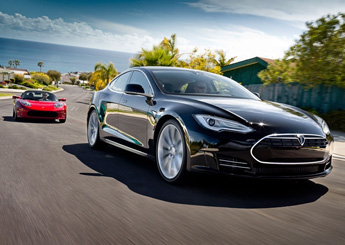Obama-backed green automaker Tesla Motors turns a profit
 Tesla Motors, a federally backed producer of high-end electric cars, says it’s making money.
Tesla Motors, a federally backed producer of high-end electric cars, says it’s making money.The company announced late Sunday that it became profitable in the first quarter of 2013 after better-than-expected sales of its Model S sedan.
Tesla said it sold more than 4,750 Model S sedans in the first quarter, up from the prior forecast of 4,500.
“There have been many car startups over the past several decades, but profitability is what makes a company real. Tesla is here to stay and keep fighting for the electric car revolution,” CEO Elon Musk said in a statement Sunday.
California-based Tesla received a $465 million Energy Department loan in 2010.
Republicans have criticized many Energy Department loans and grant programs in the past, arguing that they wasted taxpayer dollars on untested or commercially unviable technologies.
Tesla hopes to finish paying off the federal loan in 2017, five years ahead of schedule.
Fisker Automotive, another federally backed electric car company, is not faring well and may go bankrupt.
Tesla also announced Sunday that it scrapped plans to produce the least expensive Model S, a version with a 40 kilowatt-hour battery pack that started at $52,400 (after the $7,500 federal tax credit).
“Only four percent of customers chose the 40 kWh battery pack, which is not enough to justify production of that version. Customers are voting with their wallet that they want a car that gives them the freedom to travel long distances when needed,” the company said.
Instead, the few customers that ordered the 40 kWh version will receive a car with the next level up (60 kWh), but it will be “software limited” to the lower level. Those customers or future owners of the car can pay to upgrade to the longer-range battery option.
“It will still have the improved acceleration and top speed of the bigger pack, so will be a better product than originally ordered, and can be upgraded to the range of the 60 kWh upon request by the original or a future owner,” Tesla said.
The 60 kWh pack Model S, which starts at $62,400, provides a travel range of 230 miles, according to Tesla, compared to 160 miles for the less-powerful 40 kWh option.
A Model S with the longest-range pack, the 85 kWh version, starts at $72,400.
You can return to the main Market News page, or press the Back button on your browser.

